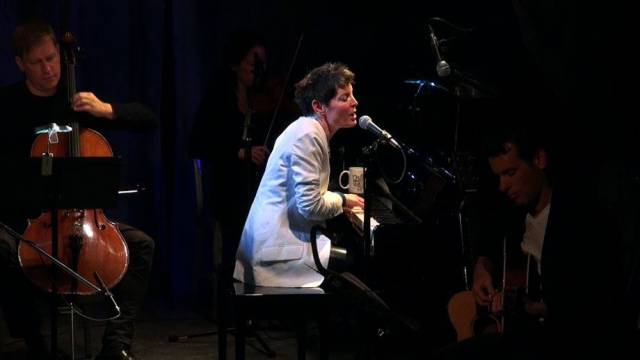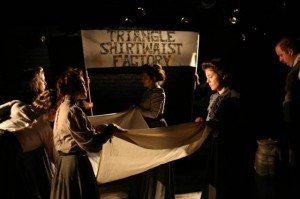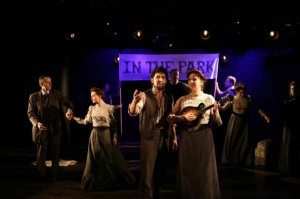

When it comes to theatre in New York City, Randy Sharp has been around the block -- or perhaps more accurately, one block, with her tenure as the Creative Director of Axis Theater spanning the past decade. Throughout that time she's been a staple in the downtown theater scene, with such works as Last Man Club and Hospital. Her most recent work, a musical about the Triangle Shirtwaist Factory Fire titled Solitary Light, again places her at the helm as writer and director, though she insists on sharing the credit with her talented team of collaborators.
During her no doubt hectic opening week, I had the pleasure to chat with her about her career at Axis, collaborating with her ex, and how inspiration can come from something as simple as a walk with your dogs.
So I guess to begin, can you talk a little bit about how you stumbled upon this specific piece of history as your inspiration?
I’m a very long term New York history person, and I’ve actually been interested in the Triangle Shirtwaist Incident for about 15 years. I came across it literally walking my dogs and reading a plaque, which was on the corner of the building. And I was like, ‘what!? I’ve never heard of that story’, and then just learning more about it. It’s actually mentioned in a couple of other plays that we’ve done. I’ve always wanted to do a full piece about it because it’s fascinating and it’s definitely a turning point in workers' rights, but it’s also a terrible, sad story, especially after 9/11, that resonates with New Yorkers.
I know that you’ve done historical works before, so I wonder, considering that this isn’t just a historical artifact, but also a real tragedy, how that changes the way that you separate the history from the fiction and changes the way that you want to portray the event to your audience?
Something tragic is also something dramatic, so if something has a pinpoint of tragedy or a pinpoint of success -- you know, has a high point in it of some kind -- it's sort of a trick to get the audience to pay attention. Oh, this is a historical tragedy, now I’m going to show you some things about the emotions of the personal lives of the people involved. What we tried to do with Solitary Light is say, ‘yes, there was a tragedy, yes, 146 people were killed. But let’s try to return that to the fact that those people were individuals, with feelings and thoughts and lives and their own storylines.’ It’s not just a workers union story. So I chose the tragedy to sort of hang the reminder that those were people, they weren’t just symbols, who were killed there.
Did I answer your question?

No, that’s perfect, and it actually kind of jumps off into my next question… I’m wondering, when you start out in a basis of historical fact, how do you start from there and find your balance of what you’re going to fictionalize? The way that you chose to interpret the incident was very dreamlike and surreal, yet you still focused heavily on individuals, so I wonder what your process is for figuring out that line between fiction and actual history.
Well, it’s difficult, because, and this goes back to the previous question, we are dealing with something that is, to some people, sacred. There’s a sacred story there. And we made up all of the stories. The process was, I didn’t want to do a play that was just ‘we work in a factory, and we’re angry about stuff, and we got killed in a fire,’ you know? I wanted to break it down a little bit, which is why it may seem a little bit surreal. Another musical may have been about the Ladies Garment Workers Union, but I wanted to sort of prismatically look at it, like in a kaleidoscope, and say, it’s about more than one thing. And then organically it split out into those sort of dreamlike stories. Because organically we stopped focusing on the Ladies Garment Workers Union and it became this prism of the period in a way.
And it still gives you an opportunity, in this instance, to promote the Coalition for Remembering the Triangle Fire?
Yes, they’ve been tremendously supportive. And in the beginning, when we weren’t doing a play that was just a straight, you know, political musical, we were apprehensive about speaking to them, but they loved it, and they’ve been nothing but supportive, and they’re doing a talk back with us on Saturday. And one of their goals is for people to remember that those were young girls who died there. It’s not just a political story, it’s a human story. And it’s our honor to promote their coalition, because I think not enough New Yorkers do know about that. You know, Washington and Greene street is just on the other side of Washington Square Park, and it’s easy to walk by. I only saw it because I walk my dogs all of the time!
That was a really surreal moment, when all of a sudden they say the address, and you go, ‘oh my gosh, that’s around the corner.’
Yeah, I love that part.

We touched on this a little bit, but speaking to your work with Axis Theatre, do you think that your process and the way you write is directly impacted by the space you're writing for? How do you think Solitary Light might change if it was in a larger venue?
Oh, that's a hard one. I've been working there I guess for fourteen years now, so I'm so used to writing for that space, but that doesn't mean that every time I create something for down there I'm completely concerned with the fact that it's very intimate. I mean, that's a tiny theatre, and we're showing you [in Solitary Light] six or seven different venues and how do we do that? And how do you make an intimate space work when you're also showing vast scapes? David Zeffren, our lighting designer, knows the space better than anybody creates those multiple worlds down there. I write specifically for that space because, um, I don't know, cause I have for fourteen years [laughter]. I mean it does effect the things I write about, because I'm putting it on in a small space for 75 people, so I'm concerned with making sure that the things I'm writing and blocking, and whatever Lynn [Mancinelli] choreographs can work in that space and I think David and Lynn have certainly created several environments.
Speaking of collaborators, what was it like working with Paul Carbonara? Have you partnered with him before?
Here's the bottom line. A lot of theatre companies say that they're collaborative and they're not. But this is really, really, really created in unison with certainly what we call the "behind the table" team, which is Lynn, and David, and David's lighting, and Steve [Fontaine] to get the soundscapes, and Paul. Now Paul and I were actually together for seven years [laughter]. And we separated about eight years ago, and we've been writing music together to whole time.
Wow.
So it's like an ongoing thing. Now, I've never written a musical before, no, but Paul and I have worked on songs that have been in other plays before. So we have an immediate language that we use to communicate quickly, musically. We've always had that, from beginning to today, that music was a language that was instantly understandable between the two of us. We have very similar tastes in music, very similar taste in arrangements. But I will say one thing which is really important is that Paul wrote every single arrangement that's in the play. So the songs that I wrote the melodies of -- it's really fifty-fifty -- but the songs that I wrote melodies of were simply melodies of songs. Paul wrote ALL the other music. All the violin, all the cello, all the piano, all the guitar. I was just like "la la la la la" and then Paul wrote the music. So knowing somebody for 18 years makes it really easy to have an immediate thing with. You know? It's like a special language of music. So working with him was easy, very easy. As it was with everybody else on the team.

That's fantastic. Obviously you guys have a powerful connection. So how do you come to a point when you know it's finished? I wonder this because it really is a fleshed out musical -- you guys have all of the components there -- but then it's over so quickly. I wonder when you come to a point when you realize "we're done, we've finished this"?
I mean, that's an instinct thing. When we knew it was an hour, we said, is it too short? And the truth is, for what it is today, that's the length. For the songs that are in it now, for the arrangements that are in it, for the choreography that's in it now, that's the length. Now, if we remount it, will it have other songs? Who knows? It's almost like, this version of it -- one hour. It's like a click. I was like, now we can make it longer, I can put in some other music, and we can have them play something longer, and we can take longer to do this, that and the other thing, but it felt like I would have been tacking that on to the musical. This version of Solitary Light is one hour. That doesn't mean that if we do it again in rehearsal that other collaborative things won't occur and that it won't become longer.
So, I've taken up enough of your time, but before we conclude, is there anything else that you'd like to say to readers about the play or about the Theatre:Village Festival?
Well, the Theatre:Village Festival is in its second year, and Dave Van Asselt from Rattlestick [Playwrights Theater], he was the genesis of it last year, and his main thrust is just to remind people that there is a vibrant off-Broadway scene in the West Village. Because we can get lost down here I think, and this festival has done nothing but point the light down here, because we need people to come and see theater down here. Last year was a huge success, and this year is looking pretty good, so we're hoping that it continues. I mean, they're already talking about the theme for the next festival.
Do you play a role in choosing the theme, or does it kind of get handed to you?
Well, we went to a bar on Bleecker Street [laughs] and we were talking about Eugene O'Neill, and the seventies, and theatre, and then somebody goes, "I have this really great play, it's about the immigrant experience." And then somebody goes, me too! It was a really cool, collaborative moment.
Brainstorming at a bar, that sounds like my kind of meeting.
And that's exactly what we were doing. And someone else said, hey, I have a play about the immigrant experience, and I say, 'hey, how about the Triangle Shirtwaist Factory? I'm gonna write a musical about the Triangle Shirtwaist fire.'
The rest, as they say ladies and gentlemen, is history.
For those of you who see Solitary Light and undoubtedly become as enchanted with the music as I did, you'll understand why my last question to Sharp was when I could hear the songs again. She reassured me not to fear, that they would be recording and releasing the soundtrack in December. For now, go see Solitary Light while you still can at the Axis Theatre through October 4. For more info and tickets, click here.
Solitary Light continues its run at the Axis Theatre through October 4.